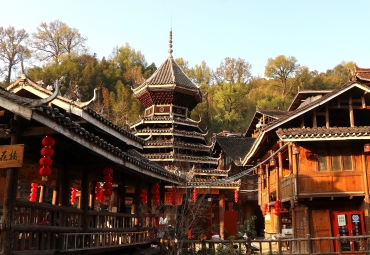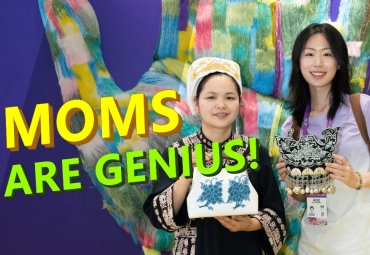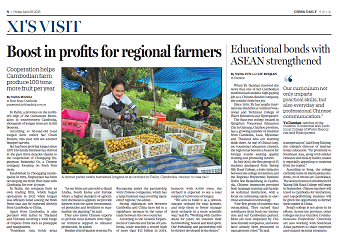Govt supports encourage Guizhou tea sellers to improve products, eye bigger overseas sales

Farmers participate in a stir-fried tea competition during a promotional event in Qianxinan Bouyei and Miao autonomous prefecture, Guizhou province, in March. [LIU CHAOFU/FOR CHINA DAILY]
Lixiang Tea Co Ltd, based in Meitan county, Guizhou province, is seeing its production facilities operating at full capacity, as it has entered its busiest business season of the year.
With three production lines running tirelessly, the tea company collects and processes 3,000 to 3,500 kilograms of fresh tea leaves per day to produce 500 to 1,000 kg of dried tea.
Operating an online store on Amazon, the company aims to build up its brand in the global market to increase the added value of its products in addition to supplying raw materials. It also has a target of increasing its exports from $28 million last year to $60 million this year.
Many tea companies like Lixiang Tea in Guizhou are expanding their sales globally, with greener production lines that are larger and more standardized.
In 2022, China's tea exports reached 375,000 metric tons, with Guizhou's tea exports standing at 4,900 tons, ranking among the top 10 provincial exporters, local news reports said.
The government has also provided policy and financing support for tea exports.
Hu Jicheng, deputy head of the Guizhou provincial department of agriculture and rural affairs, said that to help companies improve tea product quality and better expand their overseas sales, major tea-producing counties in Guizhou, in collaboration with Guizhou University, the Guizhou Academy of Agricultural Sciences and the Guizhou Tea Research Institute, held events to demonstrate many green technologies, such as biological pest control, to local companies.
In terms of agrochemical selection and use, the standards are even more stringent. Hu said: "We have launched the Guizhou Tea Industry Development Measures, the first in China, to explicitly prohibit the use of chemical herbicides in tea gardens. We have also raised the number of prohibited agrochemicals from the national requirement of 62 types to 128, considering industrial standards in overseas markets.
"In tea quality risk monitoring conducted by the Ministry of Agriculture and Rural Affairs and provincial authorities, the qualified rate of agrochemical residues and heavy metals in Guizhou tea has remained at 100 percent for 11 consecutive years."
At the same time, the provincial government is actively building platforms to help enterprises expand global sales.
On April 15, the 15th Guizhou Tea Industry Expo opened in Meitan. The event invited buyers and enterprises to discuss topics relevant to the tea production industry, and to promote the development of novel types of tea and tea exports.
During the exhibition, Lixiang Tea signed contracts of purchases with buyers from Hong Kong and North America, totaling $22 million.
As a well-established tea enterprise in Guizhou, Lixiang Tea has engaged in tea production and sales for over 20 years. The company began exploring global markets last year to generate new growth points, but the transition faced great challenges.
"From finding customers, to export inspection and Customs clearance … the process of exporting tea was a new experience full of things we were not familiar with. For example, we were unfamiliar with export inspections at the beginning and it was with the guidance from other companies who had experience in this area that we were able to proceed. There were also many errors while we were filling out forms, but government officials guided us and patiently helped us correct them," said Tan Shude, chairman of Lixiang Tea.
According to the company, last year, also the first year that Lixiang Tea started exporting, the company saw an export value of $28 million. The success has given the company confidence and it introduced four new production lines to reach its goal of $60 million this year.
The company said the new production lines are currently in the final debugging stage. Once put into operation, the equipment will be mainly used for producing teas for export, with an expected increase in production capacity by 40 percent.
Zhao Yandi in Guiyang contributed to this story.
All rights Reserved. 京ICP备13028878号-8







 Overview
Overview Guiyang
Guiyang Guian New Area
Guian New Area Liupanshui
Liupanshui Anshun
Anshun Qianxinan
Qianxinan Qiandongnan
Qiandongnan Qiannan
Qiannan Zunyi
Zunyi Tongren
Tongren Bijie
Bijie Guizhou commits to culture preservation and rural vitalization
Guizhou commits to culture preservation and rural vitalization Guizhou voice at 2025 national two sessions
Guizhou voice at 2025 national two sessions Meet the 'genius moms' at Shenzhen cultural fair
Meet the 'genius moms' at Shenzhen cultural fair 

